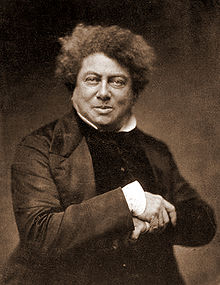I have always been an avid reader of the Classics. Most are challenging reads but there is so much insight that can be drawn from these that one gets easily acquainted with the society, past and present. Classical literature does not merely narrate stories of families, of love lost or of friendships, written by authors who lived centuries ago. The tales are deeply rooted in the prevailing complexities and dilemmas of their time. They maybe fictional, but the underlying context is very historical.
I grew up reading the works of Exupery, Dickens, Tolstoy, the Bronte sisters and Austen amongst others. Their prose reflects the political and social anxieties of their era. While A Tale of Two Cities echoes the travesties of the French Revolution, the women writers’ works such as Emma and Pride and Prejudice expose the intricacies of living in a society governed by the strict social rules of the aristocracy. I saw history and society unfold in each of these tales.
 |
| Alexandre Dumas (photo taken from Wikipedia.com) |
My interest in the Classics and eventually in history started at the age of 11 as I began reading the works of the French novelist Alexandre Dumas, whose most popular creations include The Three Musketeers. However, it was another novella which caught my initial interest, the equally masterfully written The Count of Monte Cristo. The tale begins with an idealist sea captain with a promising future whose world turns upside-down when he is accused of treason. The novel is brilliantly written as the naïve and innocent Edmond Dantes transforms into the rich, powerful and mysterious Count of Monte Cristo. Dumas weaves a complex narrative with the themes of justice, hope and vengeance during the tumultuous time of Napoleon Bonaparte’s exile.
Reading Dumas is engrossing and requires a lot of free time. His novels are full of subplots coherently linked to the major plot of the story. His characters are interestingly flawed and dynamic as he puts them in situations that blur the lines of the good and the unjust. His conflicts have depth, and realizations are sure to be profound. Readers should not expect a light offering as happy endings are not always guaranteed.
In Dumas’ works, one does not get a Victor Hugo masterpiece. One simply gets a Dumas masterpiece- a craftily written tale entrenched in the political and social underpinnings of his time.
No comments:
Post a Comment